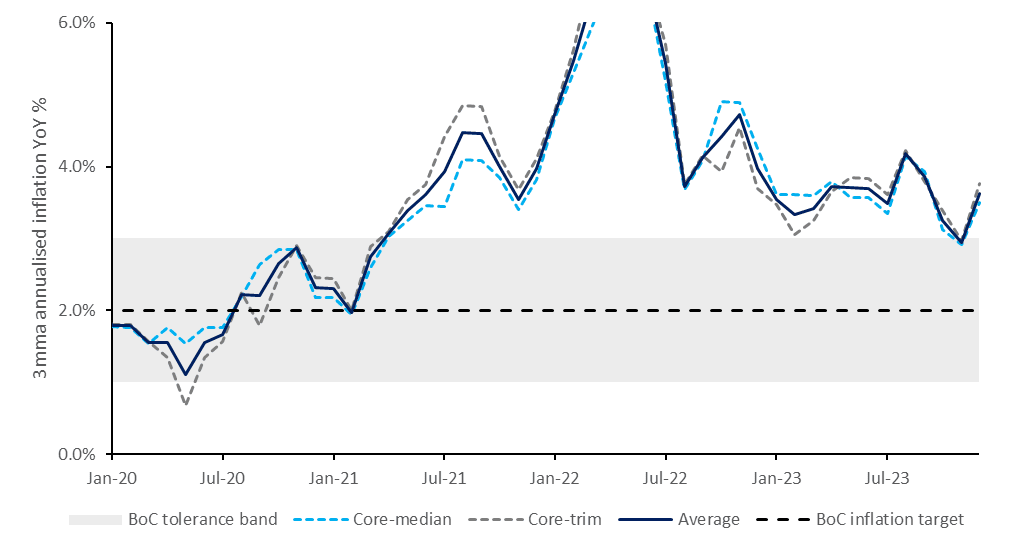Bank of Canada To Strike Hawkish Note Next Week Following Inflation Pressures: Monex

BoC Governor Macklem. Image © Bank of Canada
A rise in core inflation pressures likely means a hawkish BoC next week, writes Nick Rees, FX Market Analyst at Monex Europe.
Canadian inflation accelerated in December, rising to 3.4% YoY in line with expectations, but still a 0.3pp increase on November’s 3.1% reading.
As we warned heading into this latest release, a rise in headline price growth was widely expected due to the impact of unfavourable base effects.
In this case, it was gasoline prices that were the primary culprit, rising 1.4% YoY in the December figures, having fallen by -7.7% YoY the month prior.
A more worrying development for the BoC, however, will be the increase in core inflation readings, with both core-trim and core-median inflation readings printing above expectations.
Image courtesy of Monex Europe.
Policymakers will likely point to this uptick as a basis for holding rates high for longer, posing a risk to our forecast for the BoC to ease in early 2024.
If they do, though, this will come at the cost of growth, which should, in turn, see inflation cool rapidly, given an economy already on the brink of recession.
All told, despite the strength of today's numbers pointing to a BoC that could keep policy tighter than we previously thought, this is hardly a positive environment for the loonie if it comes at the cost of a nasty recession for the Canadian economy.
Compare GBP to CAD Exchange Rates
Find out how much you could save on your pound to Canadian dollar transfer
Potential saving vs high street banks:
C$4,450.00
Free • No obligation • Takes 2 minutes
Whether today's figures are quite as worrying as they first appear or not, we think can be argued either way. Despite the uptick in headline YoY price growth, it is notable that monthly figures continued a trend of soft prints.
MoM prices actually fell by -0.3%, the lowest reading recorded since December 2022. Moreover, whilst base effects for gasoline prices might have seen YoY prices rise in December, MoM they actually declined by -4.4%.
Stripping out the impact of volatile energy and food prices, inflation rose by just 0.2% MoM in December, following on from November’s 0.3% MoM print, with annual core CPI growth of just 3.4% for 2023.
All told, this looks suggestive of inflation having cooled to relatively benign levels in Canada, relative to other countries.
Clearly though, the rise in the core-trim and core-median inflation readings closely watched by policymakers will be cause for concern at the BoC. Both readings beat expectations by 0.3pp to stand at 3.7% and 3.6% respectively.
We would, however, note that this is not the whole picture - an upwardly revised core-median estimate meant that December’s print printed flat on the month prior.
Even so, on a 3mma annualised basis, both measures rose in December, with the average climbing from 2.9% YoY to 3.6% in the latest release.
This means that the BoC’s preferred measure of core price growth now lies above their tolerance band (see top chart), a fact that will likely support a continuation in hawkish rhetoric from policy makers come next week, something we suspect was already their preference.
The BoC’s preferred measures of inflation pressure rose in December, adding credibility to hawkish rhetoric from policymakers
Looking forward, we still think there is reason to expect inflation to fall faster than today’s number might initially suggest.
Specifically, we continue to see the labour market softening, a point highlighted by yesterday's Business Outlook Survey.
Not only this, but the survey pointed to a moderation in output prices over coming months, with easing demand and increased competition meaning fewer firms are now planning unusually large price increases.
Admittedly, inflation expectations remain high, though it is also notable that most firms suggest that they are changing their behaviour in line with this outlook. Soft economic growth should also weigh on inflation too, particularly if the BoC keeps rates high for longer in response to this latest inflation release.
Indeed, given the hawkish recent tone of BoC policymakers, we suspect this data gives them just the ammunition they need to maintain that stance at the upcoming policy meeting on January 24th.
Such a response would be risky in our view though, with weakness in economic activity already weighing on price growth, maintaining overly tight policy could well inflict unnecessary damage on the Canadian economy.





